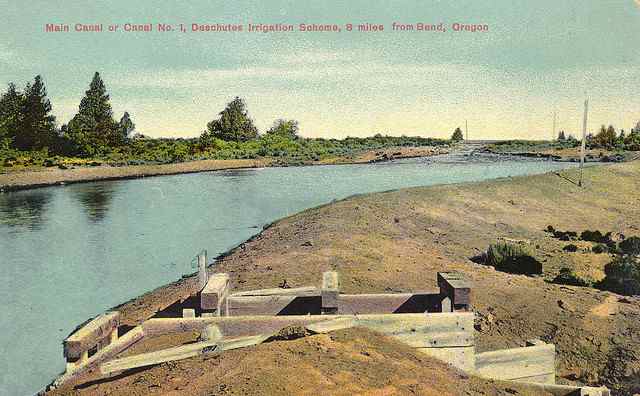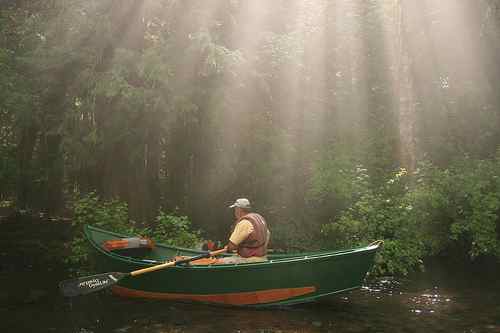Long Range Fish Report
From Sportfishing
From Sportfishing
Fish Report for 9-20-2013

Tumalo Creek Water Editorial
9-20-2013
Oregon Fly Fishing Blog
by Oregon Fly Fishing Blog
Excerpt of a recent article in the Bend Bulletin:
By Paul Dewey and Mike Tripp Bend Bulletin - July 28, 2013.
Tumalo Creek is a cherished natural resource in Central Oregon. The headwaters springs are a wonderland of scattered seeps and springs that become a full-blown creek. The majestic Tumalo Falls is one of the most photographed and visited sites in the area. The creek is the heart of Shevlin Park. Mountain bikers, runners and hikers all use the creek's trails.
Tumalo Creek is also a vital part of the ecosystem. It is the sole tributary to the Middle Deschutes for more than a 60-mile stretch of that river. It provides cold water that is critical to the health of the Middle Deschutes native redband trout.
Pictured Above: Canal no. 1, Deschutes Irrigation Scheme, located 8 miles from Bend, Oregon
Unfortunately, Tumalo Creek's history over the past 100 years has been one of degradation through dewatering for irrigation and municipal uses.
Fortunately, for the past decade or so there has been a kind of social compact involving irrigation districts, the tribes, conservation groups and local governments where all have agreed that getting more water back into Central Oregon's creeks and rivers is a shared objective. Irrigation districts have been piping canals and returning some of the water to the creeks, and local governments like Sisters are switching from surface water to groundwater.
The Central Oregon Conservation Network initiated the campaign to increase flows in Tumalo Creek because the creek's progress has lagged behind that of other Central Oregon waterways. Not counting the variable amounts of water rights temporarily "leased" instream, Whychus Creek has achieved 25 cfs in flows or nearly 75 percent of the minimum target flow of 33 cfs set by ODFW. In contrast, only about 8 cfs of Tumalo Creek has been achieved toward the target flow of 32 cfs, or 25 percent. Progress has been slow for Tumalo Creek -- from 2005 to the end of 2012, less than 3 cfs has been permanently protected. During the same time frame 19 cfs was protected in Whychus Creek and 70 cfs in the Deschutes River. Also, now the city of Bend plans to take more water from Tumalo Creek.
But just because an irrigation district or local government "can" take more Tumalo Creek water does not mean they should take more water from Tumalo Creek. That is particularly the case when groundwater and conservation are viable alternatives. Using more water runs counter to the social compact to get more flows back in Central Oregon's creeks and rivers. We need more of Tumalo Creek's cold, clear water kept instream and that is why the Central Oregon Conservation Network adopted that goal as a priority.
Paul Dewey is the executive director of Central Oregon LandWatch and Mike Tripp is the conservation chair of the Deschutes chapter of Trout Unlimited. They both live in Bend.
For background on the proposed project, check out the Oregonian.
Excerpt of a recent article in the Bend Bulletin:
By Paul Dewey and Mike Tripp Bend Bulletin - July 28, 2013.
Tumalo Creek is a cherished natural resource in Central Oregon. The headwaters springs are a wonderland of scattered seeps and springs that become a full-blown creek. The majestic Tumalo Falls is one of the most photographed and visited sites in the area. The creek is the heart of Shevlin Park. Mountain bikers, runners and hikers all use the creek's trails.
Tumalo Creek is also a vital part of the ecosystem. It is the sole tributary to the Middle Deschutes for more than a 60-mile stretch of that river. It provides cold water that is critical to the health of the Middle Deschutes native redband trout.
Pictured Above: Canal no. 1, Deschutes Irrigation Scheme, located 8 miles from Bend, Oregon
Unfortunately, Tumalo Creek's history over the past 100 years has been one of degradation through dewatering for irrigation and municipal uses.
Fortunately, for the past decade or so there has been a kind of social compact involving irrigation districts, the tribes, conservation groups and local governments where all have agreed that getting more water back into Central Oregon's creeks and rivers is a shared objective. Irrigation districts have been piping canals and returning some of the water to the creeks, and local governments like Sisters are switching from surface water to groundwater.
The Central Oregon Conservation Network initiated the campaign to increase flows in Tumalo Creek because the creek's progress has lagged behind that of other Central Oregon waterways. Not counting the variable amounts of water rights temporarily "leased" instream, Whychus Creek has achieved 25 cfs in flows or nearly 75 percent of the minimum target flow of 33 cfs set by ODFW. In contrast, only about 8 cfs of Tumalo Creek has been achieved toward the target flow of 32 cfs, or 25 percent. Progress has been slow for Tumalo Creek -- from 2005 to the end of 2012, less than 3 cfs has been permanently protected. During the same time frame 19 cfs was protected in Whychus Creek and 70 cfs in the Deschutes River. Also, now the city of Bend plans to take more water from Tumalo Creek.
But just because an irrigation district or local government "can" take more Tumalo Creek water does not mean they should take more water from Tumalo Creek. That is particularly the case when groundwater and conservation are viable alternatives. Using more water runs counter to the social compact to get more flows back in Central Oregon's creeks and rivers. We need more of Tumalo Creek's cold, clear water kept instream and that is why the Central Oregon Conservation Network adopted that goal as a priority.
Paul Dewey is the executive director of Central Oregon LandWatch and Mike Tripp is the conservation chair of the Deschutes chapter of Trout Unlimited. They both live in Bend.
For background on the proposed project, check out the Oregonian.
< Previous Report Next Report >
More Reports
The Caddis Fly Angling Shop Reports
for Friday, September 20th, 2013
McKenzie River: McKenzie River Two Fly Tournament Update
• The Willamette River water level has been holding steady and most of the system is in great shape.
The Caddis Fly Angling Shop Reports
for Thursday, September 19th, 2013
Deschutes River: The stones are out on the Deschutes and the fishing should be good
Upper McKenzie: The Upper McKenzie has been fishing well

LongRangeSportfishing.net © 2025. All Rights Reserved.
Website Hosting and Design provided by TECK.net
Website Hosting and Design provided by TECK.net